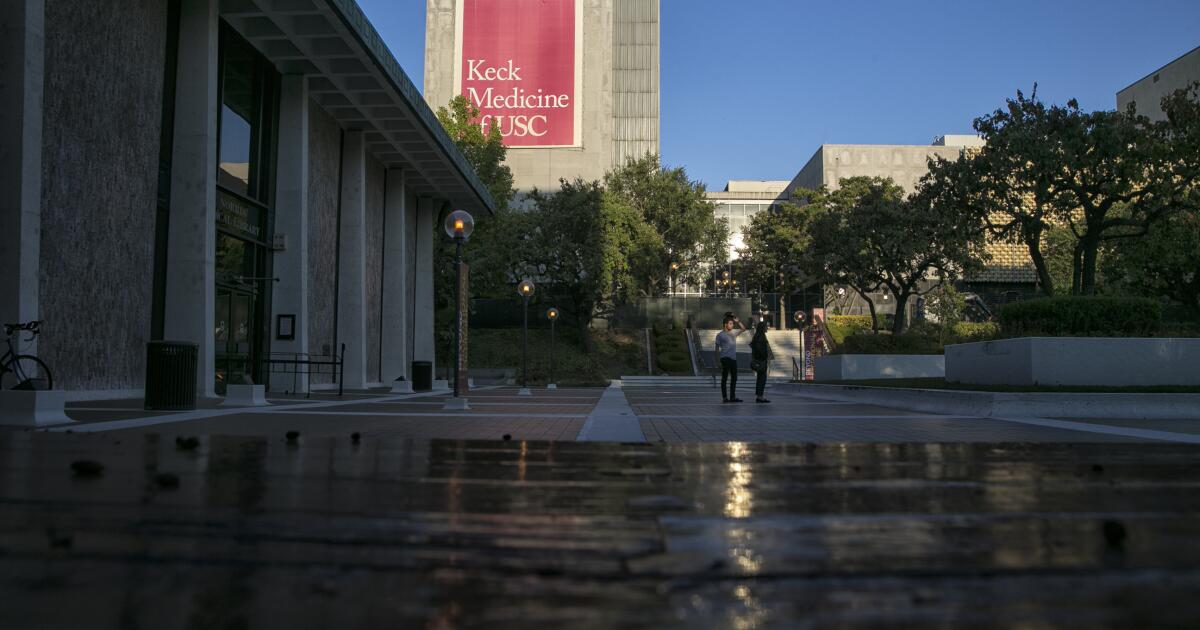Science
USC neuroscientist faces scrutiny following allegations of data manipulation

A star neuroscientist at USC is facing allegations of misconduct after whistleblowers submitted a report to the National Institutes of Health that accused the professor of manipulating data in dozens of research papers and sounded alarms about an experimental stroke medication his company is developing.
The accusations against Berislav V. Zlokovic, professor and chair of the department of physiology and neuroscience at the Keck School of Medicine of USC, were made by a small group of independent researchers and reported in the journal Science.
The report identifies allegedly doctored images and data in 35 research papers in which Zlokovic is the sole common author. It also raised questions about findings in Phase II clinical trials of a drug called 3K3A-APC, an experimental stroke treatment sponsored by ZZ Biotech, the Houston-based company Zlokovic co-founded.
Preclinical data appeared to have been manipulated, the report authors allege. In addition, the Phase II results appear to contain errors that would skew interpretation of the data in favor of the drug.
An attorney for Zlokovic said the neuroscientist takes the accusations “extremely seriously” and was “committed to fully cooperating” with a USC inquiry into the matter. However, he said his client could not comment on the allegations while the review was pending.
“Professor Zlokovic would normally welcome addressing every question raised, insofar as allegations are based on information and premises Professor Zlokovic knows to be completely incorrect,” attorney Alfredo X. Jarrin wrote in an email. “And other questions address work not performed at his lab or papers where he was not the senior author or contact author and his role was limited.”
The university also issued a statement saying it takes allegations of research integrity seriously. “Consistent with federal regulations and USC policies, the university forwards any such allegations to its Office of Research Integrity for careful review,” the university said in a statement. “Under USC policy, this review is required to be confidential. As a result, we are unable to provide any further information.”
Last year, USC’s Keck School of Medicine received from NIH the first $4 million of a planned $30-million grant to conduct Phase III trials of the experimental stroke treatment on 1,400 people.
Given the serious issues outlined in their report, the whistleblowers say those trials should be stopped immediately.
“It should certainly be paused in my opinion,” said Matthew Schrag, an assistant professor of neurology at Vanderbilt and co-author of the whistleblower report. “There are red flags about the safety of that treatment.”
He said that evidence from the USC-led phase II trial of the drug, which was published in 2018 and called RHAPSODY, raised questions of patient safety. Patients in that trial were more likely to die in the week after treatment, and more likely to be disabled 90 days later than those who were given a placebo.
In addition, Schrag said, some patients given the placebo had to wait longer for the standard stroke treatment of the drug tPA or surgery to dissolve the blood clot.
“The faster you’re able to intervene to either restore blood flow with the drug or restore blood flow by removing the clot, the more brain cells survive,” he said.
He added that he did not believe the delay was intentional but that it had the effect of “skewing the results in favor of the drug.”
Schrag previously raised questions about the integrity of other neurological research, work he said was separate from his employment at Vanderbilt.
Scientists have questioned Zlokovic’s research anonymously for years, Schrag said. Many of these concerns were published on PubPeer, a website on which anonymous contributors can examine scientific papers and highlight potential flaws.
Yet scientists working with Zlokovic did not complain publicly, he said, allowing the studies to continue for years and succeed at attracting tens of millions of dollars in taxpayer funding.
“I think people are concerned about the potential for backlash for harm to their own careers,” Schrag said. “And so I think that motivates people to just go along.”
In its report, the journal Science interviewed four former employees of Zlokovic’s lab who said that Zlokovic routinely pressured them to manipulate data. Two said they were told to discard notebooks with results that didn’t fit preferred conclusions he hoped to reach.
“There were clear examples of him instructing people to manipulate data to fit the hypothesis,” one former employee told the journal.
The severity of the data manipulation charges merits a thorough investigation of Zlokovic’s data, said Elisabeth Bik, a microbiologist and scientific integrity consultant who co-wrote the whistleblower report.
“Appropriate steps would be for USC to ask Zlokovic to give them the lab’s notebooks and data,” Bik said. “For example, for images where it appears that certain parts might have been duplicated or erased, the original images as they came off a scanner or microscope need to be compared to the published figure panels.”
Bik is among a subset of the report’s authors who are considering filing a federal whistleblower lawsuit. Should the NIH deem that any federal grant money was used improperly, a successful suit would entitle the plaintiffs to a portion of the money the government can claw back.
Zlokovic has received roughly $93 million in NIH funding, according to Science. A spokesperson for NIH’s Office of Extramural Research would not comment on the specifics of the case.
“We take concerns related to research integrity very seriously, and this may include allegations of research misconduct,” the office said in a statement.
Over the years, Zlokovic has created several biotech companies aimed at commercializing his scientific work. In 2007, he co-founded ZZ Biotech, which has been working to gain federal approval of 3K3A-APC.
Last year, Kent Pryor, ZZ Biotech’s chief executive, called the drug “a potential game-changer.”
“I believe, based on the positive clinical results to date, our 3K3A-APC will potentially create the first new drug class to treat ischemic stroke since 2003,” Pryor said.
On Tuesday, Pryor declined to comment on the details in the whistleblowers’ report. “I don’t want to get into particular explanations right now because of the ongoing investigations,” he said.
He said the Phase III clinical trial had not yet begun.
Zlokovic is a leading researcher on the blood-brain barrier, with particular interest in its role in stroke and dementia. He received his medical degree and doctorate in physiology at the University of Belgrade and joined the faculty at USC’s Keck School of Medicine after several fellowships in London.
A polyglot and amateur opera singer, Zlokovic left USC and spent 11 years at the University of Rochester before returning in 2011. He was appointed director of USC’s Zilkha Neurogenetic Institute the following year.
“My role will be to enhance an already very strong neuroscience base and try to make USC the No. 1 place in the neurosciences in the country and the world,” Zlokovic said upon rejoining the USC faculty. “It’s a big goal, but I think, with what’s going on right now, it’s actually moving in that direction. I think that could be my greatest contribution.”

Science
Former Cedars-Sinai OB-GYN surrenders license after sexual abuse complaints

Former Cedars-Sinai Medical Center obstetrician-gynecologist Barry J. Brock has surrendered his medical license following an accusation of negligent care from the state medical board.
Brock, 75, signed an agreement late last month to give up the license he has held since 1978, rather than contest an accusation the Medical Board of California filed in September regarding a former patient’s treatment. The surrender took effect on Wednesday.
While Brock “doesn’t admit any factual allegations,” his attorney Tracy Green said, he elected to surrender his license rather than invest time and money into a hearing.
Under the terms of the agreement, Brock is barred from legally practicing medicine in California for the rest of his life.
Brock retired from medicine in August. Since then, at least 176 women have filed lawsuits alleging that Cedars-Sinai and other facilities where Brock worked knowingly concealed his sexual abuses and misconduct, including medically unjustifiable procedures that at times resulted in lasting physical complications.
Brock has denied all allegations of impropriety. The OB-GYN was a member of the Cedars-Sinai physician network until 2018 and retained his clinical privileges there until mid-2024.
Cedars-Sinai confirmed in July that it suspended Brock’s hospital privileges after receiving “concerning complaints” from former patients. His privileges were terminated a few months later.
“The type of behavior alleged about Dr. Barry Brock is counter to Cedars-Sinai’s core values and the trust we strive to earn every day with our patients,” the medical center said in a statement. “We recognize the legal process must now take its course, and we remain committed to Cedars-Sinai’s sacred healing mission.”
The accusation that led to the surrender of his license focused on a patient who sought treatment in 2018 for a blighted ovum, a form of miscarriage in which the fertilized egg fails to develop into an embryo.
According to the complaint, the patient reported to Brock’s office in September 2018 for a dilation and curettage to remove remaining tissues from her uterus.
Brock ordered the patient to undress in front of him, the complaint stated, and didn’t wear gloves during the procedure, which was done without a chaperone present.
The patient experienced severe pain during the visit and bled for two months afterward, the complaint said, and no follow-up care was provided. When she visited a physician’s assistant in November 2018, the complaint said, she learned that Brock had failed to complete the dilation and curettage successfully, and she had to undergo the process a second time to remove the remaining tissue.
The complaint alleged that Brock didn’t administer sufficient pain medication and failed to properly complete the procedure or follow up with pathology findings.
While Brock’s license surrender resolves this accusation, he still faces the civil lawsuits.
Suits were filed on behalf of 167 women last year, and nine more women sued the former physician earlier this month, alleging that Brock groped their breasts and genitals inappropriately during appointments, often with bare hands, and made sexually harassing comments.
“This is why these civil lawsuits and these women coming forward … are so, so important. He can’t avoid this,” said Lisa Esser, an attorney representing the nine plaintiffs. “He’s going to be held accountable.”
Science
State rescinds suspension efforts for troubled nursing home in Hollywood

The California Public Health Department has dropped efforts to suspend the license of a Hollywood nursing home whose actions were found to have led to two patient deaths in recent years.
Brier Oak on Sunset was among seven Los Angeles County facilities that received notice last month that the state was moving to suspend their licenses.
At the time, the state believed all seven companies had received at least two “AA” violations within the last two years, a spokesperson for the Public Health Department said.
An AA violation is a relatively rare penalty issued for errors that contribute substantially to a resident’s death. California law allows the suspension or revocation of a nursing home’s license once a facility gets two such violations within a 24-month period.
Although Brier Oak received its AA violation notices 22 months apart, the residents’ deaths took place about 26 months apart, state records show.
“We recently determined that Brier Oak’s Notice was based on citation issuance date, not the date of the incidents that gave rise to the citations,” the health department said in a statement. “Therefore, this Notice of Suspension has been rescinded.”
Brier Oak on Sunset didn’t immediately respond to a request for comment.
The state investigation found that staff oversights at Brier Oak led to the deaths of two residents in 2022 and 2024.
In August, a patient died after rolling off a bed while her nurse was tending to a different patient, the state said in its citation report, which noted that paramedics found the woman lying on the floor in a pool of blood.
In May 2022, a patient died roughly 50 hours after her admission to Brier Oak. An investigation determined that staff neglected to administer crucial medications, the state said.
In a September 2022 phone interview, the patient’s family member told state investigators that “Resident 1 ‘did not get her medications for two days [from admission] and staff let her die,’” the state wrote in its report. The family member continued: “She did not deserve to die.”
The patient’s family was awarded $1.29 million in arbitration this month after a judge found that the facility was severely understaffed at the time of her arrival and should not have admitted her.
“Respondent’s Facility acted with recklessness in that they knew it was highly probable that their conduct would cause harm, and they knowingly disregarded this risk,” Superior Court Judge Terry A. Green wrote in the interim arbitration award.
License suspension efforts are still proceeding against Antelope Valley Care Center in Lancaster, Ararat Nursing Facility in Mission Hills, Golden Haven Care Center in Glendale, Kei-Ai Los Angeles Healthcare Center in Lincoln Park, Santa Anita Convalescent Hospital in Temple City and Seacrest Post-Acute Care Center in San Pedro.
Attorneys for Ararat said that the suspension was “unwarranted” and that it will be appealing. The other facilities didn’t respond to requests for comment.
Science
A Near-Full ‘Strawberry Moon’ Will Shine Again on Wednesday Night

Night sky observers are being treated this week to a view of a red-tinted full moon — known in June as a “strawberry moon” — a phenomenon that occurs when the moon sits low on the Southern Horizon.
This summer, the reddish color is particularly pronounced because the moon is sitting at the lowest position it will reach for about 19 years.
The strawberry moon’s colorful hues were visible Tuesday night, and it reached its brightest point Wednesday around 4 a.m. Eastern time.
Here’s what it looked like:
Each month’s full moon has a name.
According to folklore, the name “strawberry moon” came from Algonquin Native American tribes to commemorate strawberry gathering season. Another name for the full moon in June is “rose moon,” which may have come from Europe.
“Most of the traditional names we use seem to come from Native American usage, but some are clearly European in origin, like the one in December, called ‘the moon before yule,’ a reference to Christmas,” said James Lattis, a historian of astronomy at the University of Wisconsin-Madison.
The moon will not sit this low on the Southern Horizon again for about 19 years.
Summer full moons are always low relative to winter full moons in the Northern Hemisphere, and therefore are more reddish in color, Dr. Lattis said. That’s because viewing the moon through the atmosphere gives it a reddish hue, much like the colors visible during a sunrise or sunset, he said.
“If one looks straight up into the sky, there’s less atmosphere,” he said. “If you’re looking through the horizon, you’re looking through the most atmosphere.”
The strawberry moon will still be “visually full” for observers on Wednesday night.
Dr. Lattis said that he had viewed the moon on Tuesday night in Wisconsin, and that it was notable for the pinkish hue it had from smoke in the air from wildfires. He said the sight may not be as dramatic elsewhere.
“I hate to discourage anybody from going out and looking at the moon — it’s a wonderful thing to do, and a lot of times, if you don’t give somebody a reason, they’ll never do it,” he said. “But it’s just another full moon.”
-

 West1 week ago
West1 week agoBattle over Space Command HQ location heats up as lawmakers press new Air Force secretary
-

 Technology1 week ago
Technology1 week agoiFixit says the Switch 2 is even harder to repair than the original
-

 Business1 week ago
Business1 week agoHow Hard It Is to Make Trade Deals
-

 Movie Reviews1 week ago
Movie Reviews1 week agoPredator: Killer of Killers (2025) Movie Review | FlickDirect
-

 Politics1 week ago
Politics1 week agoA History of Trump and Elon Musk's Relationship in their Own Words
-

 World1 week ago
World1 week agoUS-backed GHF group extends closure of Gaza aid sites for second day
-

 News1 week ago
News1 week agoAmid Trump, Musk blowup, canceling SpaceX contracts could cripple DoD launch program – Breaking Defense
-

 World1 week ago
World1 week agoMost NATO members endorse Trump demand to up defence spending














